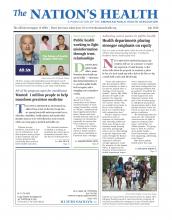Some parents are hesitant about having their children receive the human papillomavirus vaccine, but health care providers can encourage even skeptical parents to get their children vaccinated, two recent studies show.
The Centers for Disease Control and Prevention recommends that girls and boys receive the HPV vaccine when they are 11 or 12 years old so that they are protected before being exposed to the virus. The vaccine is also more effective in preteens than older adolescents, according to CDC. But despite strong evidence of the HPV vaccine’s safety and effectiveness, less than half of teens are up to date on all the recommended doses of the vaccine.
A study published in May in Clinical Infectious Diseases looked at trends among U.S. parents in vaccination intentions and reasons for hesitancy. Using data from the National Immunization Survey-Teen for 2010 to 2015, researchers found that parents of unvaccinated teens most often said they were “not likely at all” to have their children receive the HPV vaccine.
In five of the six years documented, the most common reason for hesitancy among parents was their belief that the HPV vaccine was not needed. Safety concerns and side effects were among the top reasons for vaccine hesitancy among parents of girls, although the percentage of parents with this hesitancy decreased by more than 9 percentage points from 2010 to 2015. Meanwhile, the percentage of parents of boys who were primarily concerned about the HPV vaccine’s safety and side effects increased by 7.5 percentage points from 2012 to 2015. Other reasons for parents’ vaccine hesitancy included a lack of knowledge and reporting that their teens were not sexually active.
“Parental intent to initiate HPV vaccination for their adolescents remains low and, despite improvements in coverage over time, some parents still have significant — yet largely addressable — concerns about HPV vaccination,” according to the study.
A separate study published in the May issue of Pediatrics demonstrated how health care providers can influence parents’ decisions on HPV vaccination.
With their permission, researchers recorded conversations between parents of unvaccinated adolescents and their children’s providers. They found that when providers strongly recommended the vaccine, it led to more same-day HPV vaccinations.
Providers used persistence, acquiescence and a combination of both when speaking to parents. When providers responded to parents with only persistence about their concerns, 17 of 18 adolescents were vaccinated, compared with no vaccinations when providers responded to parents with only acquiescence.
“Our study should encourage providers that even parents who initially verbalize resistance or hesitancy in an assertive manner may go on to get their child vaccinated if the provider persists in their recommendation,” study co-author Jasmin Tiro, PhD, associate professor at the University of Texas Southwestern Medical Center, told The Nation’s Health. “Our advice is that providers should first simply provide a strong, personally owned recommendation with a rationale (such as) ‘I strongly recommend the HPV vaccine for all my patients because it prevents cancer for both boys and girls.’ “Then, if parents express hesitancy or ask questions, this is the time to provide more information and explore what might be concerning the parent.”
For more information, visit https://academic.oup.com/cid/advance-article/doi/10.1093/cid/ciy232/4955216 and http://pediatrics.aappublications.org/content/early/2018/05/11/peds.2017-2312.
- Copyright The Nation’s Health, American Public Health Association









